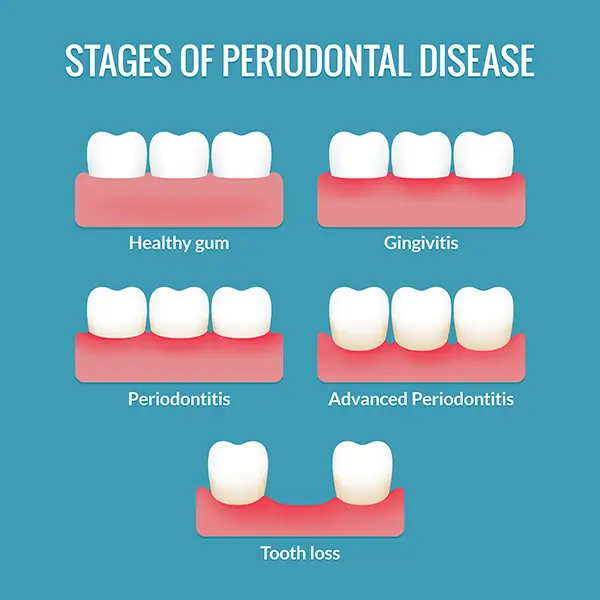Symptoms of Gum Disease The symptoms of gum disease are widespread and varied but they go back to a single cause: poor oral hygiene. When patients fail to brush and floss regularly, periodontal disease can set it and wreak havoc on their oral cavity health as well as their medical health. Some of the symptoms patients might notice are swollen or agitated looking gums, bleeding gums, sore jaw, or pain in the teeth. Periodontal disease can also lead to serious health complications including arthritis, respiratory problems, and even heart disease. The symptoms of gum disease are widespread and varied but they go back to a single cause: poor oral hygiene. When patients fail to brush and floss regularly, periodontal disease can set it and wreak havoc on their oral cavity health as well as their medical health. Some of the symptoms patients might notice are swollen or agitated looking gums, bleeding gums, sore jaw, or pain in the teeth. Periodontal disease can also lead to serious health complications including arthritis, respiratory problems, and even heart disease.The earliest stage of gum disease is gingivitis, and interestingly enough, the only stage in which the disease and its effects can be reversed and even cured. Once it moves beyond this stage, the disease cannot be cured and the only treatment available is to alleviate the symptoms. The disease itself is a lifelong commitment. Patients will need to come in for numerous cleanings and periodontal maintenance each year in order to halt the progress of the disease. Due to it being important to catch the disease as early as possible in order to diagnose it in the first stage, it is vital patients perform self-exams routinely while they are brushing and flossing. They should look for bleeding in their gums, discharge at the base of the teeth, and sores or odd growths on the tongue or gums. If patients have discovered any of those things or are worried, they may have gum disease, and should come to our office for answers. The Complications of Gum DiseaseWhen the bacteria in the mouth grows to toxic levels, it becomes dangerous and destructive. The bacteria that normally helps break down food debris to aid in digestion can become harmful to oral cavity health. Patients keep those bacteria at a normal level, by simply brushing and flossing. When patients do not brush or floss, the bacteria remain on the teeth and can become tartar and plaque. Once this occurs, gingivitis can set in which is the earliest stage of periodontal disease. Once it progresses beyond gingivitis, the disease is no longer curable. This is why it is so important for patients to pay attention to their oral pathology and note any changes. What Are the Stages of Gum Disease?The earliest stage of gum disease is called gingivitis. It is identified by patients having soreness and tenderness along the gums, bleeding after brushing, pain along the jawbone, and difficulty chewing. Once it gets to the last two stages, teeth can become loose, jaw functionality can become compromised, and patients may even find it difficult to speak. Though the disease cannot be cured once it gets beyond the initial stage, it is still important to seek treatment to slow the progression of the disease. This can be done through regular visits for treatment in our office. There are both non-surgical and surgical treatments available. Come in and see us at Implant & Periodontics Solutions to find out which type best suits your needs. Call 623-556-5442 today to get your appointment set up. |
|
|